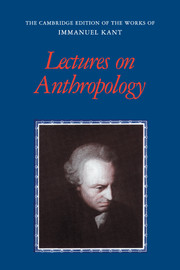Book contents
- Frontmatter
- Contents
- General editors’ preface
- Preface
- Abbreviations
- General introduction
- Anthropology Collins 1772–1773
- Anthropology Parow 1772–1773
- Anthropology Friedländer 1775–1776
- Anthropology Pillau 1777–1778
- Menschenkunde (1781–1782?)
- Anthropology Mrongovius (1784–1785)
- Anthropology Busolt, 1788–1789
- Translator's introduction
- Lecture of the Winter Semester 1788-1789 [?] Based on the transcription Busolt
- Editorial notes
- Glossary
- Bibliography
- Index
Lecture of the Winter Semester 1788-1789 [?] Based on the transcription Busolt
[Excerpts]
Published online by Cambridge University Press: 05 April 2013
- Frontmatter
- Contents
- General editors’ preface
- Preface
- Abbreviations
- General introduction
- Anthropology Collins 1772–1773
- Anthropology Parow 1772–1773
- Anthropology Friedländer 1775–1776
- Anthropology Pillau 1777–1778
- Menschenkunde (1781–1782?)
- Anthropology Mrongovius (1784–1785)
- Anthropology Busolt, 1788–1789
- Translator's introduction
- Lecture of the Winter Semester 1788-1789 [?] Based on the transcription Busolt
- Editorial notes
- Glossary
- Bibliography
- Index
Summary
PROLEGOMENA
One makes a distinction among scholastic cognition and worldly cognition.
One has scholastic cognition if one can communicate one's information according to a certain system. One possesses worldly cognition, however, when one can teach another this information in conversations or in society in such a way that one leaves out what has little interest and yet is intelligible enough, and it is consequently agreeable. Whoever cannot do this is called a ‘pedant’. A pedant, apart from this, can be a skilled man, but is only lacking in the respect just mentioned --. What concerns us in the world for the most part, what sets in motion our inclinations, our desires, and our will, is the human being. Worldly cognition is thus just the same as cognition of the human being. When this observation of human beings (anthropography) is brought to a science, it is called ‘anthropology’, and one attains to this science:
(1) through long and manifold experiences and through travels.
Remarks: If one wants to collect anthropological information through travels, then one must previously have a sufficiently connected knowledge of human beings and with it a certain plan, so that one can arrange the observations of the differences among human beings that one sees in travels.
(2) If one makes attentive observations of oneself and with other human beings.
- Type
- Chapter
- Information
- Lectures on Anthropology , pp. 515 - 524Publisher: Cambridge University PressPrint publication year: 2012

